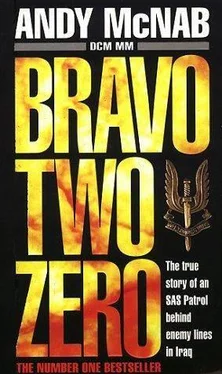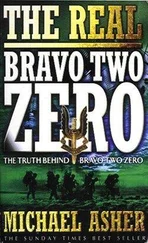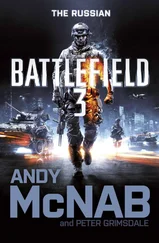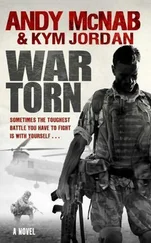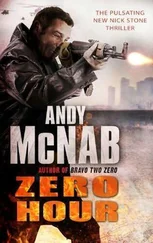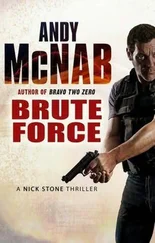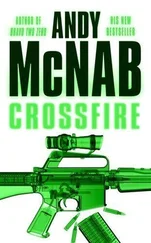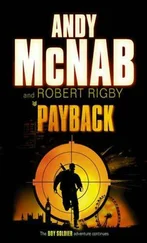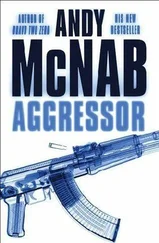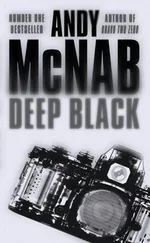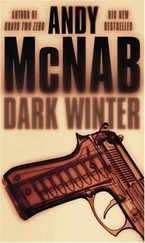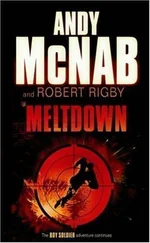We started to move over a crest. We looked down on the lights of Abu Kamal and Krabilah, the two built-up areas that straddled the border. It was just a sea of light, as if we’d run on to the film set of Close Encounters. And there were the masts, the taller one on the Iraqi side. The boys in pursuit kept firing.
“Fucking hell,” Bob shouted, “look at this, this is good news! We’re nearly there!”
Like a prat, I said “Shut the fuck up!” as if he was a naughty schoolboy. I regretted it as soon as I said it. I was thinking exactly the same thing myself. Those lights, Abu Kamal, that tower-they weren’t in Iraq, they were in Syria. I could almost taste the place. I was as sparked up as Bob was.
We ran over the crest. But the moment we came down from the higher ground we were sky lined to some boys stationed below. They turned out to be antiaircraft battery. They greeted us with small-arms fire, and then opened up with triple A. We ducked north to get across the road, committing ourselves to going through the built-up area that lay between us and the river. Vehicles were revving up near the AAA battery, and to top it all some jets screamed over. They must have been ours because the S60s diverted their fire. In the chaos we slipped away.
There was firing left, right, and behind us, but we just kept going, heads down. Heavy tracer went up vertical, then horizontal where the Iraqis were just firing at anything that was moving. It was outrageous of them because there were civilian buildings all about. We were deafened by AAA gunfire. We had to scream our instructions and warnings to each other.
We got up to a road, made a quick check, and were straight over. We stopped on the other side and took a deep breath to sort ourselves out. Going into a built up area is a totally different ballgame; it’s something you always try to avoid, but we had no choice. There was a plantation to the right, but it was protected by a high fence.
There was about 900-1,200 feet meters of habitation to get through, a big amalgamation of houses with perimeter walls. Two-inch plastic irrigation pipes ran along the ground from the houses to the plantation. We moved down, trying to use the shadows as much as possible, walking with our weapons facing out, safety catches off, fingers on the trigger. We were moving north, and the moon was in the west. I was in front. If anybody appeared I’d give it to him with my 203, and Mark would come out two or three steps and give it a burst with his Minimi. Then we’d withdraw around the first corner and reorganize ourselves, or move forward, depending on what we had been firing at.
People were shouting their heads off in the houses, lights were going off, doors being slammed. We walked: we couldn’t be arsed to run. If it was going to happen there was nothing we were going to achieve by running.
From the end of the buildings there were pathways and large pipes running down to the Euphrates about 450 feet away. Diesel pumps chugged. There was mud and shit all over the place which had iced over. We got into the corner of a plantation for a bit of cover and stopped.
The first priority was to fill up our water bottles. Two of the lads went down to the river’s edge while Mark got a fix on the Magellan. “Exactly lOKs from the border’ he whispered.
All the chaos was over the other side of the road. Tracked vehicles were maneuvering and firing, and the AAA guns were still pumping away. In the middle and far distance there were bursts of small-arms fire. They must have been shooting at dogs and anything else that moved-including each other. We were almost past caring. There were six miles to go, and we would have to fight for every mile.
We sat with our backs against the trees, watching the two lads filling the bottles.
“Ten Ks,” Dinger said. “Fucking hell, we could run that in thirty minutes.”
“Pity about the full moon,” Bob said.
“And the desert camouflage,” Dinger said. “And the fact that every man and his dog is out looking for us.”
When Mark and Legs came back with our bottles we considered the options. There seemed to be four. We could cross the river; move east to avoid the border and attempt to cross on the following night; keep going west; or split up and try any of the three as individuals.
The river was a fearsome sight. It must have been about 1,600 feet across, and after the torrential rainfall it was in full flood, flowing fast and furious. The water would be freezing. We were weakened by the long tab and lack of sleep, food, and water. We couldn’t see any boats, but if we found one it would become an option. That left swimming, and I doubted we’d last more than ten minutes. And who was to say there wouldn’t be troops waiting on the other side?
We ruled out moving east because there was too much habitation for us to conceal ourselves in daylight. Moving west seemed the best option: they knew we were in the area, so why not just keep going? But should we do it as a patrol or as individuals? Going it alone would certainly create five lots of chaos for our pursuers, but at the end of the day we were a patrol.
“We’ll go west as a patrol and cross the border tonight,” I said. “There must be some follow-up in the morning.”
It was about 2200 and bitterly cold. Everybody was shivering. We had been sweating and the adrenaline had been flowing. In these conditions your body starts to seize up as soon as you take a rest.
Looking west along the Euphrates, we saw headlights crossing a bridge a mile or so down. There wasn’t a lot we could do. We couldn’t waste time boxing around it. It was too late for anything fancy like that. We would have to take our chances.
“Let’s just take our time and patrol,” Bob said. “We’ve got enough time.”
The natural water courses ran into the Euphrates. Normally we would have kept to the high ground. It’s easier to travel along, which saves time and makes less noise and movement. We were cross-graining them to stay parallel to the river, but not so close to the water that we left sign in the mud.
The ground was frozen mud and slush. Barbed wire fences cordoned off bits of land. We encountered small, rickety outbuildings, knolls of high ground, trees, old bottles that we tripped over, bits of frozen plastic that crushed noisily underfoot. It could have been wasteland in Northern Ireland.
The wind had stopped. The slightest sound traveled hundreds of feet. We were patrolling into the moon, our breath forming clouds in the freezing air. We took our time, stopping and starting every five minutes. Dogs barked. When we came to a building, somebody would go up and check; then we’d skirt around. When we came to a fence, the first man would test to see if it was going to make a noise; then he’d put his weapon on it to force the wire down and make it good and tense, and he’d keep it there while everybody stepped over.
We had to go round a three-sided hut. The owner was snoring by the embers of a fire but didn’t stir as we tiptoed past. Forward of us was a road. If we looked to the left there was the road that ran into the frontier town of Krabilah. Lights were going on and off in buildings. Tracked vehicles trundled backwards and forwards, but far enough away not to worry us. There was still the odd shot or burst behind us. We’d been patrolling for about 2 miles. Four to go. It wasn’t even midnight yet. Hours of darkness lay ahead. I was feeling quite good.
We followed the line of a hedgerow, then cut across left into a natural drainage ditch. It ran into a steep wadi, which in turn seemed to run into the Euphrates. The wadi was about 150-160 feet wide and 80 feet deep. Both sides were more or less sheer. The bottom was virtually flat, with a trickle of a stream. We couldn’t box around it because we didn’t know how far it went. It might have headed south, and there were roads to our south that we wanted to avoid. I then noticed that it went round to the west, which would be great. We could use the shadow that it created for as long as we could.
Читать дальше
